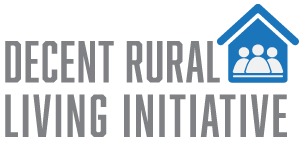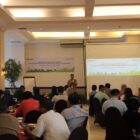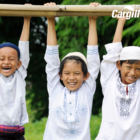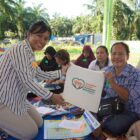24 March 2023, on the platform Zoom
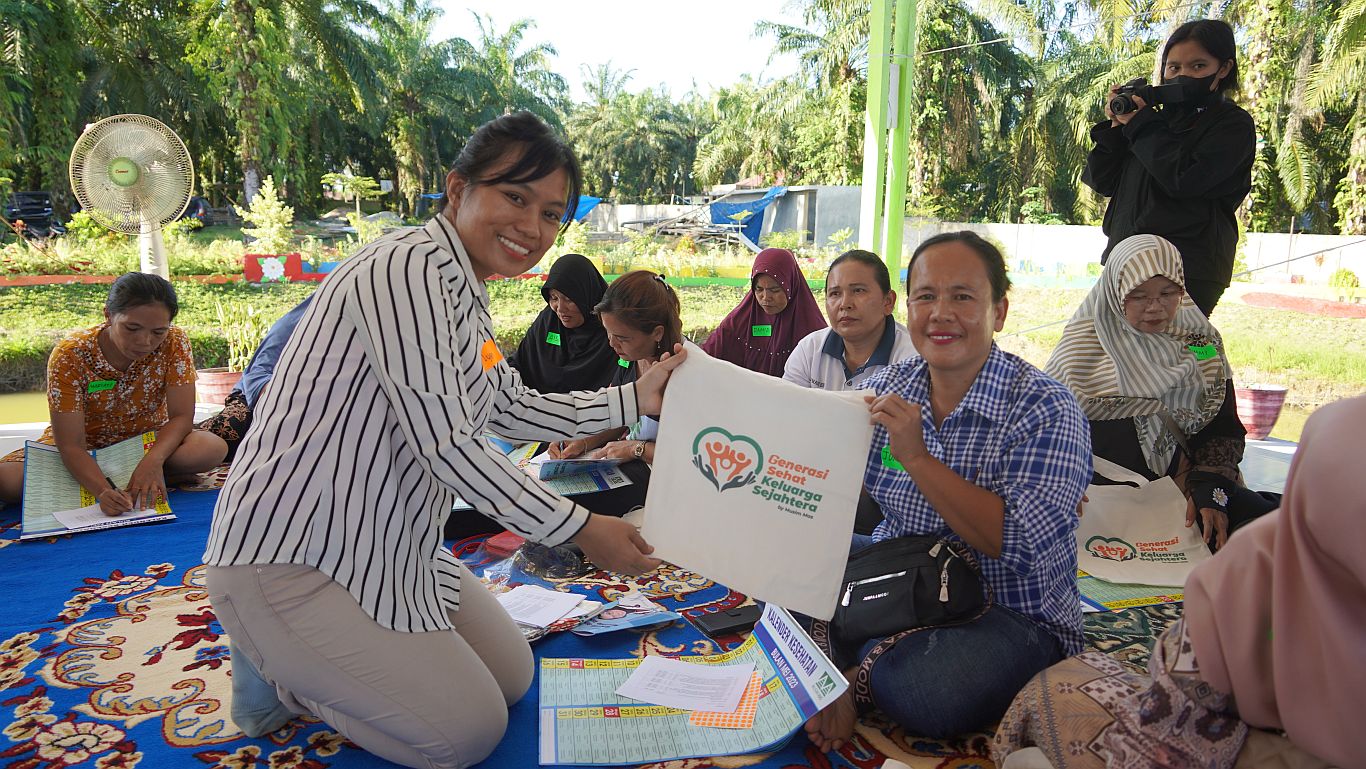
Musim Mas shared their experience on their Smallholder programs. Smallholders are key to sustainable palm oil, managing 41% of planted palm, representing 6.4 million hectares in Indonesia. These smallholders face significant challenges, including limited expertise, limited access to financing, lack of market access, and poor yields. Therefore smallholders require support to discourage deforestation and slash-and-burn agriculture.
Collaboration with IFC
Following a diagnostic study on smallholders in 2013 by the International Finance Corporation (IFC), a member of the World Bank, both IFC and Musim Mas (MM) came together to develop the Indonesian Palm Oil Development for Smallholders (IPODS) piloted in four MM mills. The program began progressively in 2015. As Musim Mas found success in the pilot programs, Musim Mas developed and implemented a modified version of the pilot for our mills and supplier mills.
The program with IFC sought to improve the livelihoods of smallholders by integrating them into sustainable palm oil supply chains. The integration would bring about financial and sustainable value, where their surrounding environment and community benefit.
Through Musim Mas’ proven experience working with IFC on independent smallholders, they were geared with the expertise to further refine their independent smallholders’ program. They developed and implemented two approaches that aim to improve the livelihoods of independent smallholders: Training for Smallholders and Training for Trainers: Smallholders Hub. These smallholder programs take place across several provinces in Aceh, North and South Sumatra, Riau, and West and Central Kalimantan. Training modules cover 4 main pillars: Environment, Business Management, Social, and Other challenges smallholders may face in their journey. Some of the modules include No Deforestation, No Peat, and No Exploitation (NDPE) principles, Good Agricultural Practices (GAP), Financial Literacy, Gender Inclusion, and Alternative Livelihoods.
Over the years, Musim Mas has evolved its program to reflect prevalent issues raised by the smallholders, including encouraging alternative livelihoods such as the planting of other crops. This is especially important in the palm industry as oil palm crops take approximately 3 years to start bearing fruit. During this time, smallholders need alternative sources of income.
A big portion of the training curriculum is on the hard skills the smallholders need to improve their production sustainably. An example of this is appropriate weeding. Soft skills like financial literacy are just as important. Many smallholders are unbanked and without formal land deeds necessary to secure loans for fertilizers which are typically the biggest cost component they face. Without fertilizers, their yields tend to be significantly lower. Musim Mas’ program teaches them the principles of financial planning, log book keeping, and provides information on the Government subsidy program by Palm Oil Plantation Fund Management Agency (BPDPKS).
Training for Smallholders
MM directly trains independent smallholders within the localities of their mills and their third-party mills. They also conduct training through one-off collaborations when opportunities arise, with the aim to integrate independent smallholders into sustainable palm oil supply chains through this program. This program provides smallholders with agronomic training, access to financial support and global markets, and education on legal requirements.
Training of Trainers Program
The other approach, Training of Trainers is to extend training to independent smallholders indirectly by training local government agricultural officials known as Village Extension Officers (VEOs). The aim is to build these VEOs’ capacity by providing instruction on GAP and NDPE principles. The VEOs then support scaling up training programs for wider reach by sharing their expertise with independent smallholders, equipping the latter with the skills and know-how needed for responsible farming.
Training for Trainers is a good way to ensure the amplification of engagement to allow for greater engagement efforts. As part of their program, they also provide ongoing support to VEOs who have completed training and help them address any barriers faced with their training roll-out. As of March 2023, there are seven smallholders Hubs established.
Children’s Nutrition, Gender Inclusivity, and Women/Youth Empowerment
Musim Mas is expanding its training modules for smallholders to include gender and youth considerations. While gender inclusion and nutrition training have always been a part of its training modules for smallholders, MM has also been focusing on women’s empowerment and business management, collaborating with university lecturers to develop nutrition-focused training modules. By involving men in the training process, they aim to promote a shift in attitudes and garner support for women. Musim Mas plans to conduct a trial involving 100 females in one district, emphasizing the importance of health with medical check-ups. Their holistic approach aims to empower women and create equal opportunities for all.
MM also looking into other modules to develop for youths. Nowadays, fewer children or young people want to stay on the plantation. The program is to encourage youths to be involved in plantations through the use of technology.
Nutrition training was done prior to this program and MM expected to do it more professionally and focused, which later can be shared within the group as well as welcoming a wider network to join. It has been a collaborative work with other companies as well. Some of Musim Mas’ efforts toward addressing malnutrition can be found here.
During this discussion, Alwi Abdul Hafiz from GAR had an inquiry on regenerated agriculture programs for smallholders. MM’s Livelihood program encourages many to take up regenerated agriculture practices, which has covered around 2500 farmers. It introduced farmers to use organic fertilizer, not chemicals or pesticides if necessary. Demoplot has been set up. This regenerated agriculture program is a 6-year program with 4 years of follow-up to get data and outcomes and how positive it can be.
Acknowledging that building trust and relationships is essential, MM found when they started this program back then with IFC that there was always a gap between big plantations and smallholders for a large range of reasons. Approaching the Head of the Village, meeting the local government, and being engaged in meetings in villages are ways to gain trust, and it takes years. MM delivers the training, provides assistance, live-in, putting feet in the ground, and provides follow-up, using local field assistance from the community. This is still going on as well as building the capacity of VEOs. MM also treasures and engage other organization like NGOs and get linked in with the program that has government support, and be part of the solution for them.
Regarding the Gender Equality, Diversity, and Social Inclusion (GEDSI) aspect, MM will initially prioritize the family unit, specifically women and children, with the objective of enhancing women’s skills. MM believes that the best way to get shed more knowledge on child exploitation and its prevention is through the ‘ibu ibu’ (community network of women), and getting them more involved in these programs.
The Decent Rural Living Initiative (DRLI) is a pre-competitive collaboration by five leading palm oil producers – Cargill, Golden Agri-Resources, MM, Sime Darby Plantation, and Wilmar. These Anchor Partners are working together, and with relevant experts and stakeholders, to develop long-term practical solutions that benefit rural workers in the palm oil industry, with an initial focus on Indonesia.
